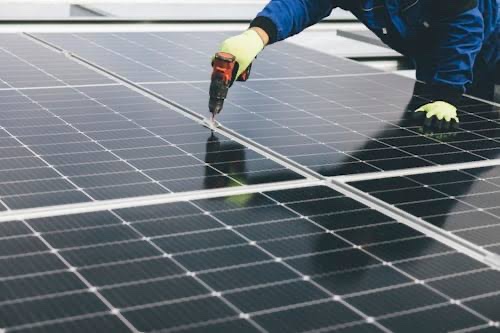Again, How State House Allocates N10Billion in 2025 Approved Budget to Presidential Villa Solar mini-grid Installation…details

Presently, the State House has allocated the sum of N10 billion in the 2025 approved budget for the installation of a solar mini-grid at the Presidential Villa.
This follows an increase in the overall budgetary allocation to the State House Headquarters, which rose from N47.11bn in the initially proposed 2025 budget to N57.11bn in the approved version.

The additional N10bn was traced to a jump in capital expenditure, which moved from N33.55bn to N43.55bn.
A breakdown of the new capital items reveals that the increase was solely due to the planned solar project, titled “Solarisation of the Villa with Solar Mini Grid,” with a full allocation of N10bn.
The move comes amid growing concerns over unreliable public electricity supply and the high cost of electricity for both households and government institutions.
The solar project is expected to reduce dependence on the national grid and limit the impact of tariff hikes on government finances.
The PUNCH observed that electricity costs have continued to soar, especially for Band A consumers, who receive at least 20 hours of electricity daily.
In April 2024, tariffs for Band A consumers surged from N68/kWh to N225/kWh, representing an increase of over 230 per cent.
Although this was later adjusted to N206.8/kWh and then slightly to N209.5/kWh in July, it remains one of the highest energy cost brackets in the country.
Institutions such as the State House, which fall within Band A, have therefore seen their electricity bills increase dramatically in the past year.
The State House has also struggled with unpaid electricity bills. In February 2024, the Abuja Electricity Distribution Company listed the Presidential Villa among top government debtors, with an outstanding bill of N923.87m.
However, following a reconciliation process, the debt was revised down to N342.35m. President Bola Tinubu subsequently ordered the immediate settlement of the amount to avoid disconnection, according to statements issued by the Presidency.
The incident underlined long-standing issues around power supply reliability and rising utility costs at the nation’s seat of power.
The PUNCH further learnt that the State House spent a total of N483.34m on electricity bills in 2024, representing a 40.17 per cent increase from the N344.82m it expended in 2023.
This is according to payment records published on the GovSpend platform, which tracks expenditures by Ministries, Departments, and Agencies of the Federal Government.
An analysis of the data showed that while the State House Headquarters made regular monthly payments to the Abuja Electricity Distribution Company, the largest payment of the year was a lump sum of N316.88m made in October 2024.
The payment was tagged as a settlement for “total outstanding electricity debt as at August 2024,” indicating that the presidency may have accumulated unpaid bills over several months before clearing them in bulk.
In contrast to 2024, the State House’s electricity spending in 2023 was more consistent, with monthly payments ranging between N28m and N30m, and no recorded arrears payment.
Despite the lower monthly amounts paid in 2024, the October clearance significantly raised the total spending for the year.
Meanwhile, the Federal Government has approved N311.09m as the electricity budget for the State House in the 2025 fiscal year.
The figure is contained in the approved 2025 budget and falls under the subhead ‘Electricity Charges’ within the broader ‘Utilities – General’ allocation for the State House.
The reduction from the actual spending in 2024 suggests a return to more moderate billing or an expectation of fewer arrears.
However, it remains unclear whether the 2025 budgeted sum will be sufficient, given the spending patterns of previous years.
The decision to transition to a solar-powered grid at the Villa is seen as a cost-saving and energy-efficient move that aligns with broader sustainability goals.
In addition to the solar mini-grid, several other projects make up the capital allocation to the State House in the 2025 budget.
One of the highest line items is the N11.92bn earmarked for the settlement of liabilities owed to Julius Berger Nigeria and other maintenance contractors dating from 2022.
This includes work done in Kaduna, the VIP wing of the Villa, as well as utility charges and waste disposal obligations.
Another N6.04bn has been budgeted for annual routine maintenance of mechanical, electrical, building, and environmental systems within Villa facilities, including the President and Vice President’s residences, offices, lounges, and the conference and banquet halls.
The State House will also spend N5.49bn on general maintenance works at the Presidential Villa in Abuja.
Meanwhile, N1.83bn has been allocated for the acquisition and renovation of EFCC-forfeited properties, which are to be repurposed as official residences.
Construction of a new office complex for Special Advisers and Senior Special Assistants will continue with N1.83bn in ongoing funding, while the renovation of four Army residences along Ali Akilu Crescent in the Upper and Lower Artillery Quarters is expected to gulp N534.13m.
An additional N120.28m is set aside for renovation works at the State House security quarters.
Other key capital items include N366.16m for the purchase of PMS and ECM equipment, and N38.45m for the procurement and installation of auditing software tools and related staff training.
The State House is also budgeting N73.35m for facility management services at the gymnasium, auditorium complexes, guest houses, and other residences, as well as N73.23m for the replacement of Villa’s telecommunications infrastructure.
Digital infrastructure and administration are receiving attention, with N50.26m allocated for maintaining the electronic document management system and N56.08m for the procurement of office equipment across various departments, including Finance, ICT, Procurement, and Audit.
~ PUNCH


